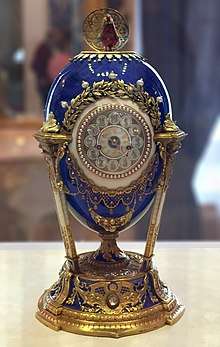Cockerel (Fabergé egg)
The Cockerel egg (also called the Cuckoo Clock egg) was crafted by Peter Carl Fabergé in his set of Imperial Fabergé eggs. The egg was given in 1900 by Tsar Nicholas II to Empress Maria Feodoronova as a gift. The egg has a mechanism on the top rear that enables its bird to come out and move.[1][2]
| Cockerel Fabergé egg | |
|---|---|
 | |
| Year delivered | 1900 |
| Customer | Nicholas II |
| Recipient | Maria Feodoronova |
| Current owner | |
| Individual or institution | Viktor Vekselberg Fabergé Museum in Saint Petersburg, Russia |
| Year of acquisition | 2004 |
| Design and materials | |
| Workmaster | Michael Perkhin |
| Materials used | gold, diamond, rubies, pearls, enamel |
| Height | 20.3 cm (open) |
| Surprise | A moving bird |
The egg is part of the Viktor Vekselberg Collection, owned by The Link of Times Foundation, and housed in the Fabergé Museum in Saint Petersburg, Russia.
References
- "Mieks Fabergé Eggs". Wintraecken.nl. Retrieved 2019-08-14.
- "http://www.treasuresofimperialrussia.com/e_chap8_cockerel.html". Archived from the original on 2012-04-13. Retrieved 2019-08-14. External link in
|title=(help)
| Wikimedia Commons has media related to Cockerel (Fabergé egg). |
This article is issued from Wikipedia. The text is licensed under Creative Commons - Attribution - Sharealike. Additional terms may apply for the media files.